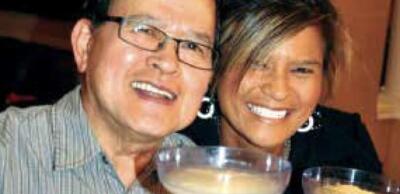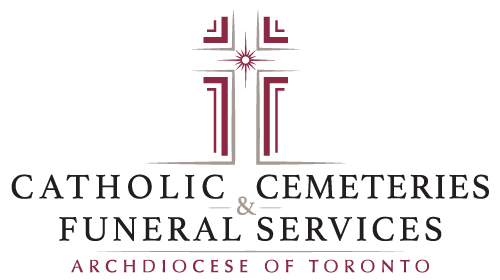elevated VzFRY

Renato Augilar, left, was determined to relieve the burden on daughter Gina and the rest of his family by pre-planning his funeral. He chose a Catholic cemetery for burial so that his remains could be consecrated in sacred grounds. (Photo courtesy Gina Aguilar Palmer)
BY WENDY-ANN CLARKE
(Originally published in The Catholic Register)
In the spring, Gina Aguilar Palmer took an afternoon off to visit friends and family who had been laid to rest at Assumption Catholic Cemetery in Mississauga, Ont. With deep family roots in the city, she paid respects to the memory of 12 loved ones, including her mother-in-law, a nephew who passed as an infant and, most recently, her father who was laid to rest in April. Determined to make things as painless as possible for their three daughters, Palmer’s parents had pre-planned for their end of life choosing every detail and making sure everything was paid for. Their headstones, she says, had been selected and etched with their birthdates for well over 10 years.
“My parents’ main thing was ‘When our time comes, when God calls us home, we really don’t want you guys with financial expense.” said Palmer. “They just wanted to make it as easy as possible when they passed.”
It is often overwhelming for families when a loved one passes on and there are no arrangements made, says Amy Profenna, director of marketing and public relations at Catholic Cemeteries of the Archdiocese of Toronto. There are many decisions for a family to make including trying to guess what the deceased would have wanted.
During an intense grieving process, disagreements about decisions and financial strains can trigger conflict in families and make the time of bereavement that much more difficult. Making your desires known alleviates a tremendous amount of stress for loved ones.
“It’s important that you make your wishes known to your family,” said Profenna. “Letting your family know that you want cremation, or you don’t want cremation. Or whether you want to be buried in a mausoleum or in the ground, all these things. There’s really no argument about it when you make your wishes known to your family through your Will and through your estate planning.”
When she lost her father, a grieving Palmer said it was so much easier on her and her family. All it took was a simple phone call to Assumption and letting them know the date of the funeral and coordinating things with the church.
Her father, Renato Aguilar, who died at 85 years old, was a mechanical engineer known for his generous spirit and his strong Catholic faith, says Palmer. He was a parishioner at Merciful Redeemer Parish in Mississauga and also attended daily Mass at Sts. Peter and Paul with his beloved wife Cres, who will join him one day at Assumption.
Catholic burial and arranging a final resting place consecrated in sacred grounds is particularly important to Catholics like the Aguilars, says Profenna. A shrine to faith rooted in religious tradition, Catholic burial ensures respect for the deceased and reverence for their physical remains.
“By choosing a Catholic cemetery one selects a final resting place that respects their beliefs and values from their personal life journey,” said Profenna. “It’s a resting place that’s sacred and it’s a place where one can await the resurrection of the dead and the promise of eternal life. Belonging to a parish your whole life, one could say that Catholic cemeteries are an extension of a parish where those who’ve worshipped and prayed together in life now await the resurrection of the body and death.”
Today, the majority of clients visiting Catholic Cemeteries are coming in to pre-plan arrangements, says Profenna. Planning in advance can even improve quality of life through giving people that much needed peace of mind that decisions about their final arrangements have been made spiritually and prudently. Knowing that they will be providing their family peace of mind during a very emotional and stressful time is also helpful.
Appointments happen virtually or in person and involve meeting with a funeral director to select products and services that are right for the client and their family. The cemetery has family counsellors available to walk clients through all the steps involved in planning, including whether to be cremated or buried and choosing a grave, crypt in a mausoleum or a niche for the placement of cremated remains.
“I’ve met a lot of people who were very nervous or apprehensive about making their final arrangements,” said Profenna. “But everyone whom I’ve spoken to has afterwards felt like a great sense of relief and they’re really glad that they did.” Having had the experience of planning for family members while she was grieving, Palmer says experiencing the difference pre-planning can make was a huge blessing for her family. Palmer and her husband are preparing to follow in her parents footsteps in making their funeral arrangements in advance.
“It just helped the grieving process extremely because it helped us concentrate on our own healing plus being there for our family. We’ve been influenced enough to make the decision to definitely do the same for our children.”

